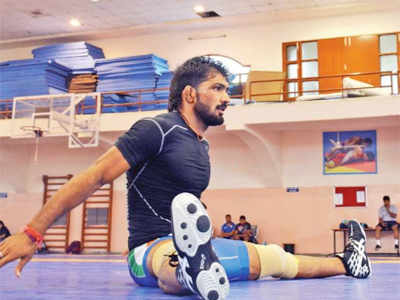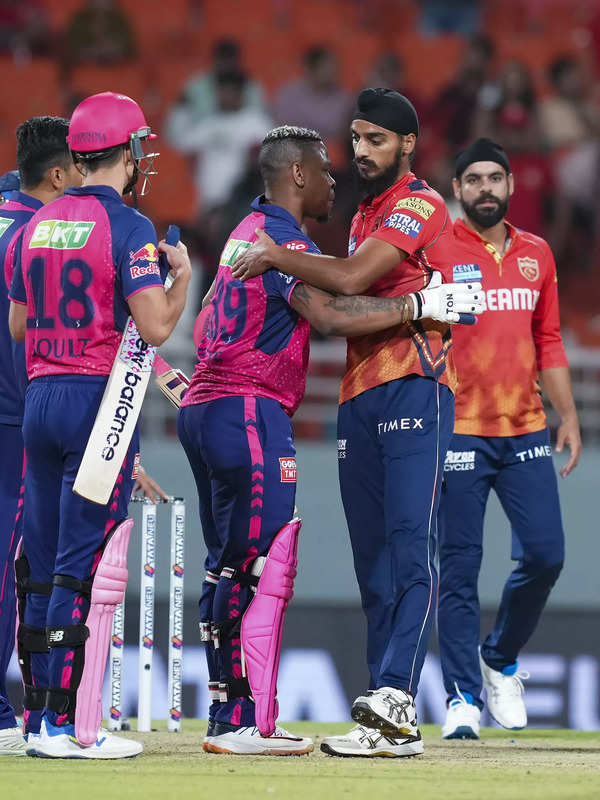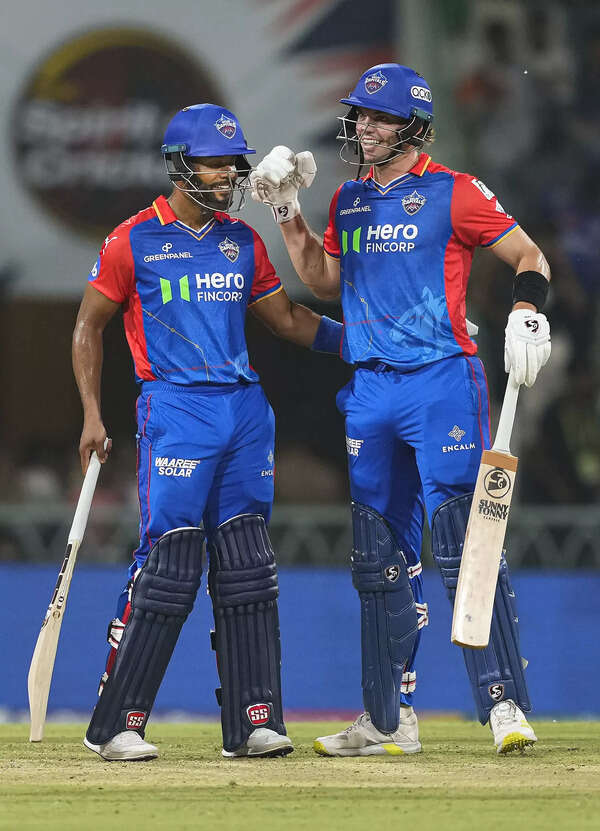- News
- Sports News
- Rio Olympics: Yogeshwar nurses a burning desire
Trending
This story is from July 23, 2016
Rio Olympics: Yogeshwar nurses a burning desire
For someone who only first learnt of Olympics as an idea when Leander Paes won the bronze in 1996, Yogeshwar himself is a veteran of sorts. Rio will be his fourth Games and turning into a monk each time comes naturally to him now.

(TOI Photo)
Key Highlights
- "The day I won that bronze in London, I set myself a target, which was to claim gold at the Olympics," Yogeshwar said.
- Rio will be Yogeshwar's fourth Olympics.
- "After the 2014 Asiad gold, I made quite a few changes," Yogeshwar said.
A newspaper flutters in the mild air-conditioner breeze of Yogeshwar Dutt's Type IV quarters at the SAI Centre in Sonepat. Prominent in the crinkled paper is an announcement for this year's Eid release at the nearby multiplex. There's Salman Khan in his rustic wrestler's avatar half completing his dangal manoeuvre over some hapless opponent, there's the akhara sand flying all over for effect.The newspaper gently flutters, Salman too looks as if he's trembling. Intriguingly, irrespective of where you are sitting in Yogeshwar's drawing room, Salman the Pehalwan always seems upside down to you. It's like the Mona Lisa at the Louvre effect any which way you look at it, it follows you.
It is a slightly strange setting. Yogeshwar, in all his pocket-sized hulkiness, 28-inched at the waist, super shape and supremely-fit the real deal regards the scene with his typically quiet, sullen disdain. "Shaaddi kisi ki, baraati koi, aur dulha koi," he says dismissively as if he has no time for such trivialities anymore. But uttered in his heavily-accented Haryanvi, he makes it sound all the more menacing, or comical, depending on where you stand on the Salman-Olympics ambassador issue. It was Yogeshwar who waded in headlong when the actor was controversially appointed goodwill ambassador for the Indian Olympic contingent, questioning why no sportsman was seen fit enough to be accorded the honour. He merely nods at the recent memory, not impatient, just having risen above it all.
But it also immediately sets Yogeshwar apart in this whole Rio Olympics business. You could say, there's a strange Salmanization of Yogeshwar himself. It's difficult to explain how. For one, there are very few or no hangers on, but there hangs in the air a strange broodiness to Dutt that would be very typical of a Salman. The only time he breaks out into an automatic grin all day is when you comment that his Body Mass Index (BMI) would be at the lowest ever. "No, it is still around 6," he says, clearly aware of how the hours spent in the gym have so spectacularly borne fruit.
But it is also his strangely controversial stands, especially his poem on the JNU-Govt stand-off following the Afzal Guru sloganeering, make him something of a Twitter-vigilante, or a loose cannon, again depending on where you stand. Ironically, it makes him perhaps the only Indian sportsman who speaks out on issues, while the sense of the misguided is a throwback to the ways of the man whose appointment as his Olympic contingent's brand ambassador he so memorably questioned. "Shaaddi kisi ki, baraati koi, aur dulha koi."
But then, we digress. Simply, Yogeshwar Dutt is in the prime form of his life. He is our one big medal hope for Rio.
He pulled a muscle in his back during the morning sparring with old friend, rival and confidante Bajrangi. There was the usual silent commotion that follows such a mid-mat interruption. The impassive physio pressed and pinched trying to locate the knot, ice was crushed in an old towel and applied while others looked on and spoke in hushed tones. Bajrangi looked so worried as if he would break down but then, that could be his everyday face. "Hota hai," Yogeshwar waved off the concern later, in true Bhai-style. There was nothing that could deter him to climb off his zone, where he seems so comfortably nestled in at the moment.
"The day I won that bronze in London, I set myself a target, which was to claim gold at the Olympics. I wasn't satisfied with third place, and if I wanted to win gold in 2016 in Rio, I would have to begin preparations immediately. Before 2012, the dream was to just win an Olympic medal, and that disappointment of not getting gold in London has spurred me on to this day," he says.
For someone who only first learnt of Olympics as an idea when Leander Paes won the bronze in 1996, Yogeshwar himself is a veteran of sorts. Rio will be his fourth Games and turning into a monk each time comes naturally to him now. "I had three operations in 2015, and I was out of action for almost the whole year, but when I was injured or free from training, I was just thinking about how to prepare for Rio, how to build my legs, how to improve my strength. I also changed my weight category from 60kg to 65kg. But I did win gold at the 2014 Asian Games, and gold at any other event that I participated in. That gave me the confidence that I can do well in the 65kg category.
"Kuch paane ke liye, kuch khona padta hai," he informs us. He says, as part of a carb-free diet, he hasn't eaten a roti in nearly two months now; there is paneer and fruits without the juice to eliminate the sugar intake. His diet is bland, he hates it, but he does it.
"After the 2014 Asian Games gold, I made quite a few changes. My diet, then I started avoiding lots of things. I never went out much anyways. I rarely went home, maybe on Sundays I'd go and meet my mother and house-folk for 2, 3 hours, then I'd sleep and leave for the training centre in the morning. Talk is less. I've even asked them not to come to meet me unless there is an emergency . My phone is also switched off, and I only use it if some important work comes up.
"I want that Rio gold so badly..."
It is a slightly strange setting. Yogeshwar, in all his pocket-sized hulkiness, 28-inched at the waist, super shape and supremely-fit the real deal regards the scene with his typically quiet, sullen disdain. "Shaaddi kisi ki, baraati koi, aur dulha koi," he says dismissively as if he has no time for such trivialities anymore. But uttered in his heavily-accented Haryanvi, he makes it sound all the more menacing, or comical, depending on where you stand on the Salman-Olympics ambassador issue. It was Yogeshwar who waded in headlong when the actor was controversially appointed goodwill ambassador for the Indian Olympic contingent, questioning why no sportsman was seen fit enough to be accorded the honour. He merely nods at the recent memory, not impatient, just having risen above it all.
But it also immediately sets Yogeshwar apart in this whole Rio Olympics business. You could say, there's a strange Salmanization of Yogeshwar himself. It's difficult to explain how. For one, there are very few or no hangers on, but there hangs in the air a strange broodiness to Dutt that would be very typical of a Salman. The only time he breaks out into an automatic grin all day is when you comment that his Body Mass Index (BMI) would be at the lowest ever. "No, it is still around 6," he says, clearly aware of how the hours spent in the gym have so spectacularly borne fruit.
Without the entourage an aspect that is so Sushil Kumar, Yogeshwar is his own lone wolf. He seems to have wrested this mantle of the alpha male of the wrestling contingent with a quiet glee, almost as if he was waiting for the Sushil-Narsingh issue to blow up like it did, and pave the path for his elevation, as it were. "We don't speak to each other anymore," he says simply, a hint of a lisp adding to the accent, on the broken friendship with Sushil. "It was a long friendship, but that's not the case anymore. I haven't had the time also to mend any broken bridges and I just want to focus on myself. I haven't wished badly on anyone till now, and I think I'm fine where I am, so I haven't spoken to Sushil about mending things." End of story .
But it is also his strangely controversial stands, especially his poem on the JNU-Govt stand-off following the Afzal Guru sloganeering, make him something of a Twitter-vigilante, or a loose cannon, again depending on where you stand. Ironically, it makes him perhaps the only Indian sportsman who speaks out on issues, while the sense of the misguided is a throwback to the ways of the man whose appointment as his Olympic contingent's brand ambassador he so memorably questioned. "Shaaddi kisi ki, baraati koi, aur dulha koi."
But then, we digress. Simply, Yogeshwar Dutt is in the prime form of his life. He is our one big medal hope for Rio.
He pulled a muscle in his back during the morning sparring with old friend, rival and confidante Bajrangi. There was the usual silent commotion that follows such a mid-mat interruption. The impassive physio pressed and pinched trying to locate the knot, ice was crushed in an old towel and applied while others looked on and spoke in hushed tones. Bajrangi looked so worried as if he would break down but then, that could be his everyday face. "Hota hai," Yogeshwar waved off the concern later, in true Bhai-style. There was nothing that could deter him to climb off his zone, where he seems so comfortably nestled in at the moment.
"The day I won that bronze in London, I set myself a target, which was to claim gold at the Olympics. I wasn't satisfied with third place, and if I wanted to win gold in 2016 in Rio, I would have to begin preparations immediately. Before 2012, the dream was to just win an Olympic medal, and that disappointment of not getting gold in London has spurred me on to this day," he says.
For someone who only first learnt of Olympics as an idea when Leander Paes won the bronze in 1996, Yogeshwar himself is a veteran of sorts. Rio will be his fourth Games and turning into a monk each time comes naturally to him now. "I had three operations in 2015, and I was out of action for almost the whole year, but when I was injured or free from training, I was just thinking about how to prepare for Rio, how to build my legs, how to improve my strength. I also changed my weight category from 60kg to 65kg. But I did win gold at the 2014 Asian Games, and gold at any other event that I participated in. That gave me the confidence that I can do well in the 65kg category.
"Kuch paane ke liye, kuch khona padta hai," he informs us. He says, as part of a carb-free diet, he hasn't eaten a roti in nearly two months now; there is paneer and fruits without the juice to eliminate the sugar intake. His diet is bland, he hates it, but he does it.
"After the 2014 Asian Games gold, I made quite a few changes. My diet, then I started avoiding lots of things. I never went out much anyways. I rarely went home, maybe on Sundays I'd go and meet my mother and house-folk for 2, 3 hours, then I'd sleep and leave for the training centre in the morning. Talk is less. I've even asked them not to come to meet me unless there is an emergency . My phone is also switched off, and I only use it if some important work comes up.
"I want that Rio gold so badly..."
End of Article
FOLLOW US ON SOCIAL MEDIA










